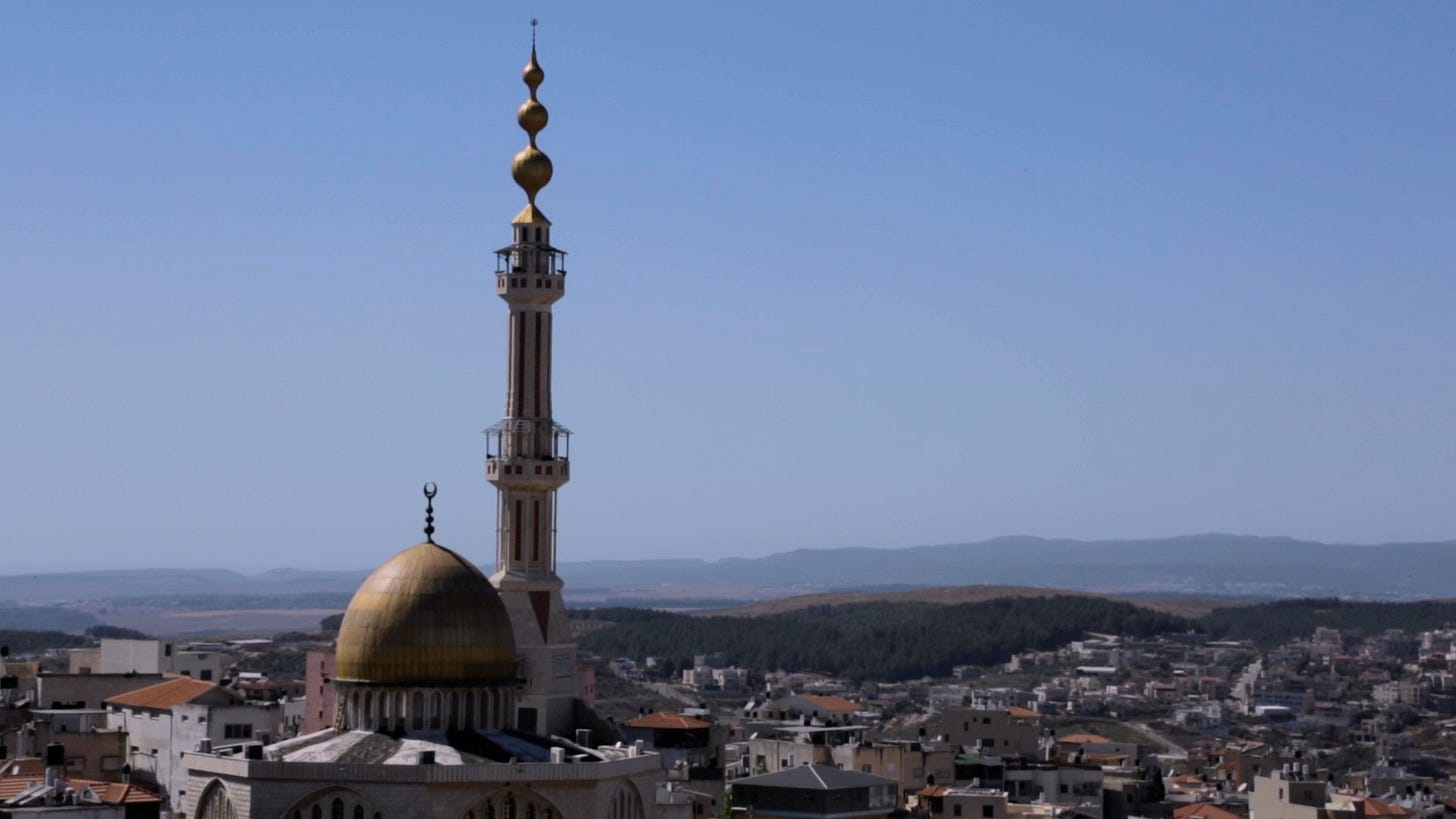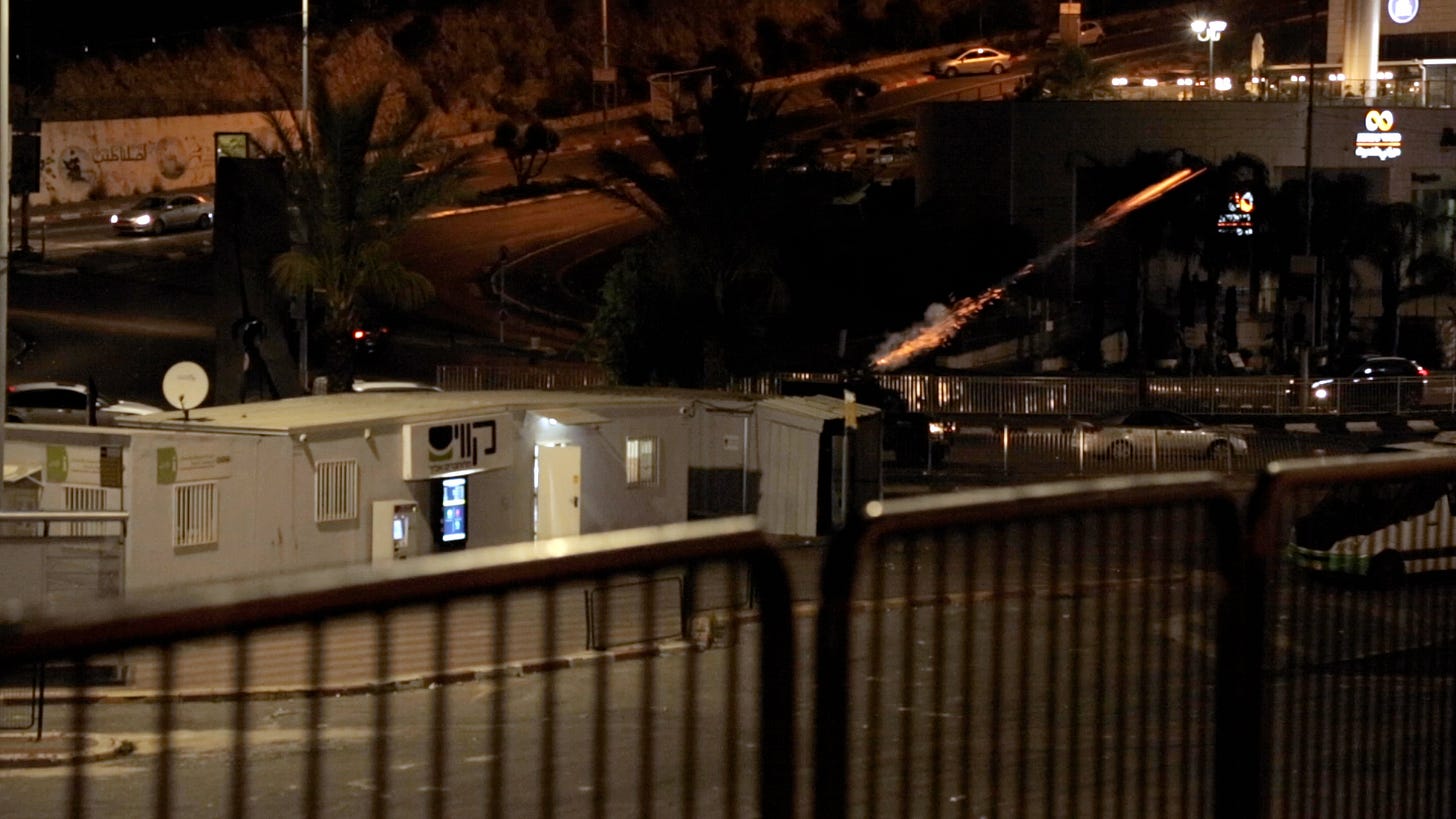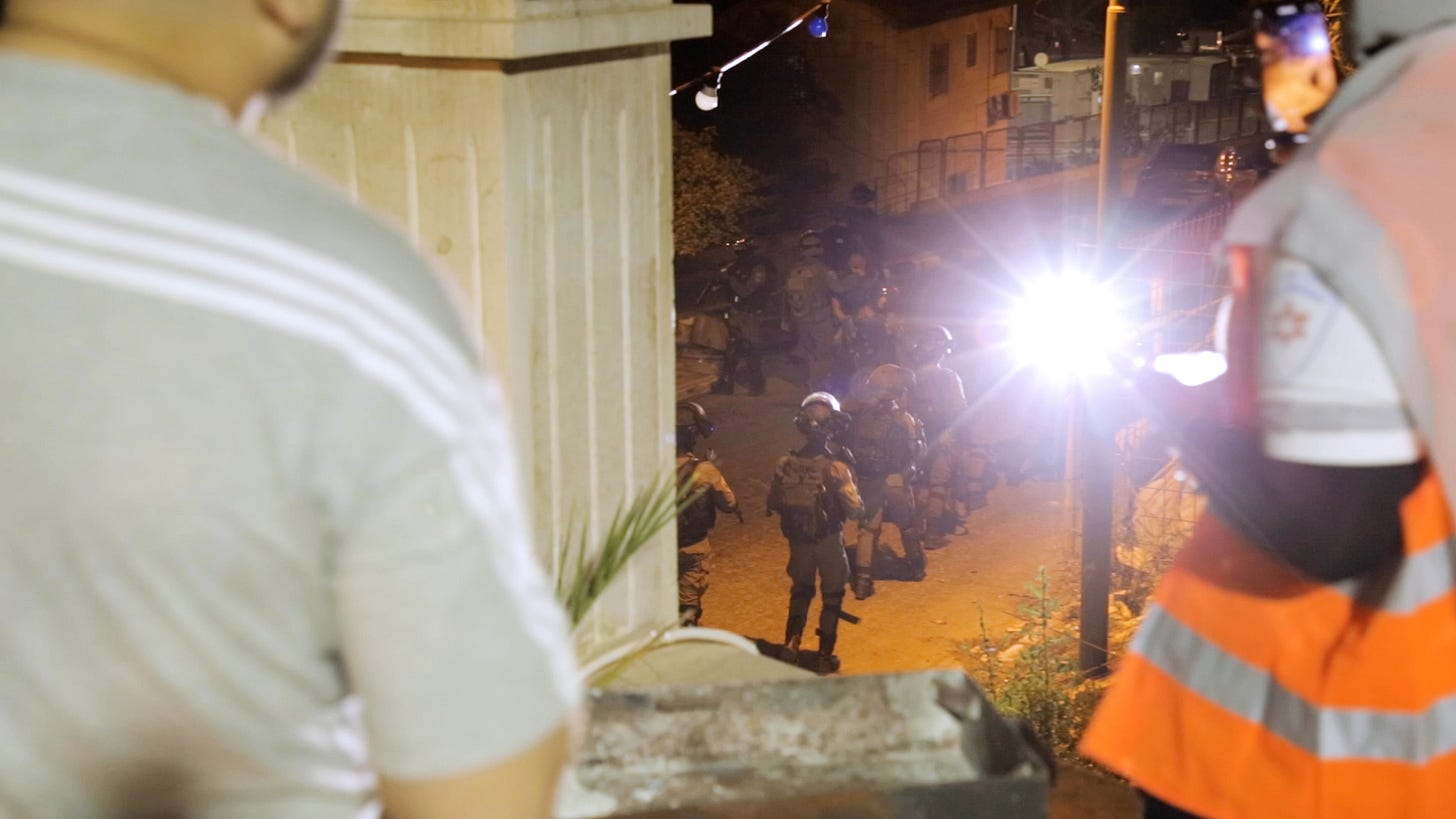Over/Under
Organized crime and gun violence flourished inside a Palestinian community that was systematically under-resourced. Now, Israeli police are using that as an excuse to arrest people en masse.
Muhammad Aghbariah had just gotten home from a protest against gun violence when he was shot and killed in his doorway.
The 21-year-old lived in Umm El Fahm, a community that had transformed from a farming village into one of the largest Palestinian cities inside Israel after the Nakba in 1948. Located in the Triangle area, it borders the West Bank and has become densely populated and dramatically under-resourced over time.
In the lead-up to the Unity Intifada, Umm El Fahm was one of the first places Palestinians started to push back in 2021. They planned weekly protests. They went into the streets every Friday to protest police and state negligence that had allowed violence to grow in the community.
Muhammad had already lost several family members to gun violence, including his brother. In Umm El Fahm, educational and municipal resources were few and far between, and Palestinian citizens had to face down routine discrimination within the Israeli job market. Under-policing meant organized crime—and therefore gun violence—flourished.
Muhammad’s murder, like most in Umm El Fahm, was never solved.
In the months after his murder, after the protests had grown, fanned even more by police violence targeting activists in East Jerusalem’s Sheikh Jarrah neighborhood, the Israeli government’s approach suddenly changed. Then-Prime Minister Naftali Bennet announced a plan to target “Arab crime.”
Arrests for nonviolent crimes went up. And gun violence continued. Only now, more Palestinians were being sent to jail.
Umm El Fahm wasn’t originally meant to be as big as it became. It was only after Palestinians had been expelled from their home cities that people began to gather there. This process is still used today; Israeli policies often displace Bedouins in the Naqab, for example, and force them to group into cities.
In recent years, Israeli politicians began flirting publicly with the idea of “swapping” Umm El Fahm with the West Bank with settlements there, a move that would legitimize illegal Israeli outposts and strip Umm El Fahm residents of their movement and voting rights—not to mention their access to government services like health care.
January 2021 was the midst of the pandemic, with some of the worst months yet to come. The Israeli government was beginning to release the first batch of vaccines, earning them good press from around the world. But the quarantines had been brutal on Palestinians. Throughout 2020, police across the region had been using lockdown orders to target Palestinian communities by ticketing them in higher numbers.
The process was neither effective nor unique to this part of the world, but it became routine: starve communities of resources and then use force and arrests to portray them as worthy of repression. Israel’s government has followed this pattern since 1948.
Umm El Fahm’s one and only entrance road—clogged each day repeatedly—is a visual testament to that systemic denial of resources. Just to the edge of the city, a Jewish Israeli town called Mei Ami remains gated, with soldiers dedicated to working the entrance. Across Palestine, the visual disparity is blatant: in Jisr al Zarqa, in Kfar Qasem, in Silwan, in Hebron, in Jericho, alongside Route 443. Palestinian areas are always instantly identifiable.
In 2021, the state had ordered broad erosion of privacy that would track residents in the name of stopping disease, powers that were quietly left in place. And the government was calling loudly for annexation of the West Bank, a threat that put in the line of fire some of the most marginalized Palestinian communities in Area C. While the pandemic kept everyone inside, the Israeli government grew bolder.
Young protestors in Umm El Fahm growing up here described to us in May 2021 how they know that the Israeli society will reject them, motivating them to take to the street. It had been months since Muhammad’s death and it was the start of the Unity Intifada, with Palestinians rising up across the region against apartheid. These were teenagers, planning to go to university, but knowing their job prospects and stability would always come with an asterisk.
In the protests, another teenager, Muhammad Kiwan, was killed by police while in his car with friends. They were near the Mei Ami gated community on the outskirts of Umm El Fahm. The footage from the gate also disappeared that night, and Kiwan’s family has never seen any admission of wrongdoing or compensation from the state.
By 2022, the Israeli government claimed to be running a campaign to curtail violent crime among Palestinian citizens. But news reports, documents and interviews with activists show the government has not only failed to reduce the number of killings, they’ve compounded the problem by increasing arrests for nonviolent crimes.
For example, Israeli police said they’ve increased the arrests made for weapons. “In 2021, about 1,190 indictments were filed against suspects involved in… weapons use offenses, compared to about 880 indictments filed during 2020, most of them against suspects from Arab society,” said the spokeswoman for the Israel Police by email.
At the same time, Israeli officials themselves in 2021 decried a broad inability to address the problem by police.
Some Umm El Fahm residents say they know who killed Aghbariah, and it’s common knowledge that the killer is an informant for the police. The day before the shooting, they said, police had come to remove a camera that was installed across the street for an investigation into a previous murder. Officially, the case remains unsolved.
“Umm El Fahm is a community where everybody knows everybody,” said one resident who’s been threatened for speaking out against gun violence. “The secrets and problems are not kept so well.”
A protest movement focused on demanding action from the state on violent crime was just beginning at the time. Aghbariah’s death prompted a wave of residents to come out, and activists formed a patchwork of protest groups to coordinate their plans. For months, they demonstrated every Friday.
“After the seventh week, everyone wanted to join… the whole country, the Arabs,” said 21-year-old activist Karam Jabarin. “We planned to be in thousands, tens of thousands, to arrive in Umm El Fahm for eighth protest.”
On the seventh week, police closed access to the city and attacked the protestors, injuring the mayor and effectively stifling the demonstrations for a few months. The uprising across the region in May 2021 in response to forced expulsions in Jerusalem and attacks on Al Aqsa mosque by the Israeli military later prompted renewed, daily protests with a broader target: a system of apartheid enacted by the state and police themselves.
The subtext for this broader focus was a spate of arrests that targeted activists and demonstrators in Umm El Fahm, leading to a belief that the state was more interested in targeting protestors than people who committed violent crimes. Sereen Jabareen, an activist from the early days of the protests, said there have been 500 cases of murder in the city since 2000 but only 3 have been solved.
Within weeks, the Israeli government led by Prime Minister Naftali Bennett announced a plan to address violence in Palestinian communities—a move described by activists as “too little, too late”—focusing on increased police operations. Some activists now see the move as a cynical attempt to respond to the fact that Palestinian protests in 2021 took place in “mixed” cities with large Jewish Israeli populations, like Jaffa and Haifa.
“We look at it as a colonial approach to fight crime,” said Adi Mansour, a lawyer with Adalah Legal Center for Arab Minority Rights in Haifa. For example, he said, money from fines and fees due to policing in the city goes to the state and not the municipality, further disenfranchising the entire community.
For activists like Jabarin, the problem has gotten worse in the past year because it has revealed that the state has no intention of addressing the problem.
“We see no change a year later, we see no change,” said Jabarin. “Crime still exists, the people who make crimes are still free, everybody knows who they are, but they act like they don’t… We are bursting inside, we want to solve the crime, we can’t handle it. We lose every week somebody, young people, old people.”
Umm El Fahm’s police department didn’t even exist until 2003.
It was built in the years immediately following the Second Intifada, when more than a dozen residents were killed by police. It was a small building, tucked behind a hill at the city’s entrance. The new building is massive, overlooking the city and highlighting an increase in funding from the federal government.
Before 2021, Palestinian lawyers and activists said, many in the community sought police intervention as a solution to the problem of violent crime. But after a heavy-handed response by police led to arrests, the message of activists changed: the state itself was creating an untenable situation for Palestinian citizens.
During the protests in May, Jabarin said participants felt unsafe from all sides.
“We were surrounded; from one side,” he said, “from the police attacking us and making us retreat, and the other side, the crime organization, also... It’s how we live in Arab cities in Israel, that’s our life.”
One document written up by activists highlights a shift in the changing mindset regarding police. Titled “Police are the root of the trouble,” the document accuses police of increasing the levels of crime with their presence and by actively increasing the number of guns in the community, referencing an interview in which Gilad Erdan, then-Minister of Public Security, said 90% of weapons in Arab communities originate in Israeli military warehouses.
“It is no secret that the police facilitate the delivery of weapons for the purposes of crime and infighting to the hands of criminals, as well as deliberately neglecting the investigation of crimes and arresting the perpetrators,” the document reads.
The problem leads to a cycle of over-policing. A 2021 comptroller’s report showed that between 2017 and 2019, 94 percent of shooting crime suspects were Palestinians. The problem has also led to more violence within the community: the same report found that violent crimes against Arabs increased each year between 2015 and 2019, jumping from about 13,000 annually to 15,000.
Activists and lawyers argue that the state’s handling of Palestinian communities inside Israel has gone from under-policing to over-policing. Under-policing of violent crime, combined with a lack of access to well-paying jobs and education as well as outdated, bottlenecked infrastructure, led to the development of organized crime that created black markets, like offering high-interest loans to people who faced discrimination at Israeli banks and resorting to violence to enforce payment, or setting up a makeshift checkpoint at a gap in the apartheid wall that runs along the edge of the city. At this gap, Palestinians from the West Bank cross without having to show paperwork to reach their jobs inside Israeli sectors like construction and agriculture. If crossers don’t pay the person at this gap, they might call the police to come pick up the crosser for coming into Israel illegally.
Amjad Shbita, with a nonprofit called Sikkuy-Aufoq, said the problem of organized crime was only partly about policing.
“We are talking about the poverty in Arab society, the socioeconomic situation in Arab society, a lack of infrastructure in Arab towns, a black market, and organized crime,” he said. “One of the major problems is that there is a very high percentage of youth that have no academic studies or jobs. I think that something like 30 percent of the Arab youth in Israel have no job and no studies…they have no future. They are very easy victims for these organizations.”
In fact, Shbita said, he’s seen violence increase in Palestinian towns even as police have opened more precincts in the past decade.
The 2021 comptroller’s report found something similar. In Nazareth, the largest predominantly Palestinian city in Israel, a plan to split the police station in two and increase policing backfired. The state found that police had achieved none of their stated goals for reducing crime as a result of this expansion.
Shbita said the lack of infrastructure has created a huge problem for residents of the city, compounding the challenges of day to day life.
“If you visit Umm El Fahm, there are very narrow streets in the city, there is no place for parking the car,” he said, explaining the state never came to plan the area and left ambiguities about who owns what land and who can build where. This means moving around the city can be extremely difficult, leading to brutal traffic build-up and terrible commutes for people who live there.
For lawyers at Adalah, the process is part of the same state-level racism that has been part of Israeli government since its founding.
“We are the enemy, eventually” Mansour said of Palestinians with Israeli citizenship. “And citizenship in Israel means nothing.”
Special thanks to Omar Jabareen.






